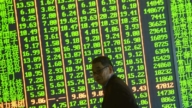【新唐人2014年07月07日訊】目前,中國房地產商因資金鏈斷裂陷入絕境的現象,已經由二、三線城市蔓延到樓市堅挺的一線城市。日前,上海一國際廣場項目因資金鏈斷裂被迫停工,鬧市區的在建工程被法院貼上了封條。業內人士指出,未來融資困難、銷售不暢的中小房企,恐怕會處於更加危險的境地,而相關金融機構的風險也在積聚增加。不過這時黨報發文聲稱,房市疲軟,房價下跌對經濟影響十分有限,相反將有利於中國經濟結構向更高質量增長進行調整。
上海市嘉定區曹安商圈,林立著數家超大型批發商場,來往的貨車絡繹不絕。然而身處繁華地段的「悅合國際廣場」項目,卻因為開發商資金鏈斷裂,延遲交房半年,已經停工一個月,並拖纍多家金融機構深陷其中。
據大陸《中國證券報》報導,「悅合國際廣場」已經被上海市閔行區人民法院,以財產保全的名義正式查封,同時也被徐匯區人民法院以執行需要的名義輪候查封。
面對全國房市一片叫慘的景象,7月2號,《人民日報》海外版發文說,房市疲軟,房價下跌對經濟影響十分有限,樓市步入調整期,是在經歷所謂10年高增長之後的理性回歸,將有利於中國經濟結構向更高質量增長進行調整。
大陸經濟學者鄧先生:「虛張聲勢,把水攪渾,現在大家都看清了,把中國經濟拖垮,到那時候受害最大的不是房地產商或者是老百姓,因為經濟崩盤的話,那就意味著社會制序也會遭受巨大的社會動盪,這都是政府不願意看到的。
大陸財經評論員牛刀:「中國是個專政主義國家,他是集團主義國家,在房地產發生問題的時候,央行啊!就是包括政府啊,動員一切的手段來維護這個房價,他不按市場來走,這樣大家一看是政府在秘密保護泡沫,所以大家拚命衝進泡沫當中。」
據報導,「悅合國際廣場」在建工程被查封的主要原因,是「悅合置業」與多家銀行之間的債務糾紛。「悅合國際廣場」部分在建工程的抵押權人,是浦發銀行閔行支行,債權數額為2億4000萬元。另外,建設銀行、寧波銀行和「悅合置業」之間也存在不同形式的債權債務關係。
而位於杭州的商品房項目「田逸之星」一期,原本應該於去年年底交付,由於開發商拖欠建設工程款,工程在去年6月停工。
今年3月,寧波奉化最大房企「興潤置業」出現資金鏈斷裂,資不抵債,總負債35億多元。5月初,全國百強房企「光耀地產」因債務危機,瀕臨破產,波及到多家銀行、信託和類信託計劃。
北京大學光華管理學院博士生導師王建國:「真正害怕房地產下跌的還是政府。因為房地產崩盤的話,一些銀行會有倒閉的風險,政府要救銀行就得發鈔票,發鈔票又會導致通貨膨脹。那麼地方的地也賣不掉,那地方政府就根本沒法運作,沒有了土地財政,又要讓社會穩定,就必需發鈔票借給地方政府,這樣的話又是惡性通貨膨脹。」
在中國,因為地產項目陷入險境,房地產信託「踩雷」者不斷增多。蘇州「榮辰置業發展有限公司」發行的一款去年8月份到期的資金信託計劃,在今年5月初傳出,信託計劃沒能足金額兌付本息。
而去年11月,「新華信託」發行的山東「火炬置業有限公司」貸款集資信託計劃,因為違約進入司法訴訟程序﹔同一個月,四川信託因與融資方的借款糾紛,將旗下信託計劃合作方起訴。今年,「新華信託」陷入與上海「高遠置業」的信託糾紛中﹔而「五礦信託」起訴上海「榮騰置業」追討4億元的債務。
同時,中國各地頻頻出現房地產商跑路現象。去年,唐山一家房地產商扔下13億欠款跑了,害得投資者服毒自殺。今年4月,江蘇無錫樓盤沒有完工,開發商卻已消失,數百購房人血本無歸。
採訪編輯/劉惠 後製/舒燦
China's State Media Cheerful on Real Estate Market Impasse
The break of capital chains has caused China's
real estate market to reach an impasse.
Now this phenomenon is spreading from small
and medium cities to big ones.
A project in Shanghai was forced to stop
and the property under construction in a busy neighborhood
was sealed up by courts.
Some professionals are saying that future financing issues
and sluggish sales will put small and medium real estate
companies into a more challenging situation.
Meanwhile, the risks faced by those financial structures that
are associated with the real estate market are escalating too.
Nonetheless, the party's state run newspaper published
an article saying that the housing market and sale price slump
won't impact China's economy too much.
State media say that, to the contrary,
it will help transform China's economy to a high-quality growth.
There are so many extra-large wholesale supermarkets
in Caoan Business Circle, Jiading District, Shanghai city.
Trucks carrying goods come one after the other.
Yet, work on the “Yue He International Square” project,
located in the busy area, was suspended a month ago
because the developer's funding chain broke.
This project will be delayed for another half a year
and quite a few financial structures were trapped in the process.
As reported by China Securities Journal,
"Yue He International Square” was officially seized
as collateral by Shanghai Minhang District People's Court,
and in turn, Xuhui District People's Court.
The housing market has been bleak across China.
The overseas edition of party mouthpiece People's Daily
published an article on July 2, saying that the bleak housing
market has very limited impact on China's economy.
It says home prices have gotten into the phase of adjustment,
which is a rational regression after 10 years of high growth,
and the changes in the housing market will help transform
China's economic structure to one of high-quality growth.
Mr. Deng, Chinese economist: “The party is making
an empty show of strength and trying to confuse the public.
Now we clearly see that if China's economy falls apart,
the hardest hit victims won't be developers or ordinary people.
If China's economy collapses, it will bring about social chaos,
which the party is unwilling to see.”
Niu Dao, China financial commentator: “China is a dictatorship.
When the real estate market is in trouble, the Central Bank
and the government will do anything to maintain housing prices.
They never follow the market.
When people realize the government is trying all means
to protect the ‘housing bubble’, they will dive into the bubble too.”
Reports say the main reason “Yu He International Square”
was sealed up is the debt entanglement
between “Yue He Properties” and banks.
The Minhang branch of Shanghai Pudong Development Bank
is one of the mortgagees of Yue He International Square
with $39 million in debt secured.
Meanwhile, China Construction Bank and Ningbo Bank also
have many forms of a debtor-creditor relationship with Yue He.
"Tian Yi Zhi Xing, a real estate project in Hangzhou,
should have been completed by the end of last year.
However, the developer defaulted on their loan,
so the project was suspended last June.
This March, Xing Run Properties, the biggest developer
in Fenghua, Ningbo, came across funding problems
and was $564 million in debt.
Guang Yao Properties, one of China's top 100
real estate companies, almost went bankrupt,
which has an impact on many banks and trust firms.
Wang Jianguo, doctoral supervisor from Guanghua School
of Management, Peking University: “It is the government
that fears most about the collapse of the real estate market.
Once the real estate market falls apart,
there are risks that some banks might go bankrupt.
If the government wants to save the banks,
more money needs to be printed, which will cause inflation.
If local governments aren't sell the land off,
they can't operate normally either.
With no income from land sales,
the central government will have to lend money
to local governments to maintain local stability.
Again, it's malignant inflation."
In China, since the real estate market is running into more
and more risks, real estate trusts have become endangered.
Suzhou-based Rong Chen Real Estate Development
issued a trust expected to have matured in August last year.
However, until this May, the trust hadn't received
the full principal and interest payments.
In November 2013, Xinhua Trust issued a loan funding
trust plan for Shangdong-based Torch Investment.
Because of a breach of contract,
it's now in judicial proceedings.
During the same month, Sichuan Trust sued its trust plan
partner because of a loan dispute with the financiers.
This year Xinhua Trust was trapped into a loan dispute
with Shanghai-based Gao Yuan Properties.
Wu Kuang Trust sued Shanghai-based Rong Teng Properties
to recover a debt of $64 million.
Quite often, developers run will away from their debts.
Last year, a developer in Tangshan disappeared,
and left behind $209 million in debt.
A lot of investors have been so desperate
that they've committed suicide by taking poison.
This April, one developer disappeared before the property
under construction was completed in Wuxi city, Jiangsu.
Hundreds of home buyers lost out.
Interview & Edit/liu Hui Post-Production/Shu Chan




























